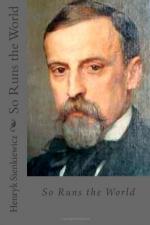Such was the case in “Germinal” and “La Debacle.” The immensity of socialism and the immensity of the war simply crushed Zola with all his mental apparatus. His doctrines became very small in the presence of such dimensions, and hardly any one hears of them in the noise of the deluge, overflowing the mine and in the thundering of Prussian cannons; only talent remained. Therefore in both those books there are pages worthy of Dante. Quite a different thing happened with “Docteur Pascal.” Being the last volume of the cycle, it was bound to be the last deduction, from the whole work the synthesis of the doctrine, the belfry of the whole building. Consequently in this volume Zola speaks more about doctrine than in any other previous volume; as the doctrine is bad, wicked, and false, therefore “Docteur Pascal” is the worst and most tedious book of all the cycle of Rougon-Macquart. It is a series of empty leaves on which tediousness is hand in hand with lack of moral sense, it is a pale picture full of falsehood—such is “Le Docteur Pascal.” Zola wishes to have him an honest man. He is the outcast of the family Rougon-Macquart. In heredity there happens such lucky degenerations; the doctor knows about it, he considers himself as a happy exception, and it is for him a source of continuous inward pleasure. In the mean while, he loves people, serves them and sells them his medicine, which cures all possible disease. He is a sweet sage, who studies life, therefore he gathers “human documents,” builds laboriously the genealogical tree of the family of Rougon-Macquart, whose descendant he is himself, and on the strength of his observations he comes to the same conclusion as Zola. To which? It is difficult to answer the question; but here it is more or less: if any one is not well, usually he is sick and that heredity exists, but mothers and fathers who come from other families can bring into the blood of children new elements; in that way heredity can be modified to such a degree that strictly speaking it does not exist.




